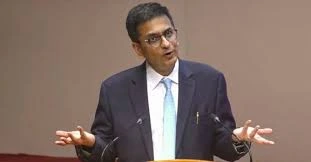Chief Justice of India DY Chandrachud on Friday stressed on the power of hearing, stating that since it was not always possible for the judges to rectify every injustice within the constraints of the rule of law, they should at least give a patient hearing to the people appearing before them.
Delivering his farewell speech at a function organised by the Supreme Court Bar Association (SCBA), the CJI highlighted the impact judges could have on the lives of ordinary people.
The healing process in court not just lie in the ability to grant relief, but in a judge’s ability to listen to those who came before him.
Stressing on the critical role played by the Bar in guiding and educating the Bench, he said while judges encountered their own limitations, lawyers knew the balance of a matter.
Speaking about the impact of the judiciary on the common man, the CJI said what made the judges tick was the realisation that they could truly make a difference to the lives of ordinary people.
He mentioned an order allowing two visually-challenged candidates to participate in the Rajasthan Judicial Service Examination, leading to their qualification.
He recounted another case involving an aspiring doctor with severe lower-limb myopathy who was initially barred from medical school due to his disability; after a third medical board examination, an interim order allowed his enrolment in MBBS.
The outgoing CJI shared two instances where the Court intervened to ensure admissions for economically-disadvantaged students: one at IIT Mumbai, wherein a student faced technical issues with fee payments, and second a Dalit student admitted to IIT Dhanbad who lacked funds for the admission fee, to whom the Court granted relief.
He further mentioned the case of a member of the Bar with hearing and speech impairments, for whom the Court arranged a sign language interpreter.
Noting that the Supreme Court had traditionally been a Chief Justice-centric Court, he said he felt the need to reform the structure.
The Registry looked to just one person, the Chief Justice. This had to change, said the CJI, adding that he experimented with constituting committees and had a remarkable experience.
He revealed that he implemented a system in the Supreme Court to publicly display data on all pending cases, after finding around 1,500 cases stashed away in a Registrar’s cupboard when he assumed office.
The CJI said he mandated that every case in the system be assigned a unique number, aiming to bring greater order and transparency to the court’s processes.
Regarding the pendency of cases, the CJI said that the figure stood at 82,000, including both registered and unregistered cases. The CJI said that the actual number of pending cases has decreased by over 11,000 in the past two years. He further disclosed that around 21,000 bail cases had been filed and disposed of during his tenure.
Highlighting his commitment to transparency, the CJI said several reforms were motivated by his belief that Sunlight was the best disinfectant. He said that he had exposed his personal life to the public, even if it opened him up to scrutiny and criticism, particularly on social media. The CJI said his shoulders were broad enough to accept all the criticism faced by him and grow with the experience.
The outgoing CJI further mentioned his experiences with online trolling, noting humorously that those who often criticised him may now find themselves unemployed following his retirement.
He also spoke about his experience of heading the Collegium, appreciating his colleagues for their unity, mutual respect, and lack of personal agendas. He said the Collegium’s efforts were rooted in a shared commitment to the institution’s interests.
The CJI recalled sitting through the Collegium, sometimes making tough choices and taking tough decisions.
The CJI said the Collegium members never had a difference of opinion. All meetings were conducted with a huge sense of humor, with a smile and some snacks thrown in for good measure. The important part was that the Collegium members never lost sight of the fact that they were not here with personal agendas at work, but to subserve the interests of the institution. In subserving the interests of the institution, the Collegium has been able to scale many, many heights, he added.
The CJI further appreciated the tremendous support given by his colleagues and the Bar had been crucial in all the initiatives taken towards making the courts paperless.
He recalled that during his initial years as a judge, his father, former CJI YV Chandrachud, had bought a modest flat in Pune and insisted that he keep it until the end of his judicial tenure. As per CJI Chandrachud, his father urged him never to compromise his integrity, offering the flat as a safeguard should he need a roof over his head.
He further said that his father was an utter disciplinarian, but he never disciplined his children. Instead, he made sure that his children learnt by seeing him.
Recalling his days as the Chief Justice of Allahabad High Court, the CJI said he learnt to be humble after realising the vast knowledge of law. He said he learnt a lot when he was confronted with new areas of law. The CJI observed in this context that judges in High Courts who rose from the District Judiciary, had a wealth of experience.
Expressing pride over the Supreme Court’s resilience, the CJI said he was confident that the future of the institution was in ‘solid, stable, and erudite hands’ under the leadership of Justice Sanjiv Khanna.
He said he hoped to continue dreaming even as he moved beyond his tenure as CJI.
Justice Chandrachud was elevated from the Allahabad High Court on May 13, 2016, to be appointed as a Supreme Court Judge. He was sworn in as the 50th CJI on November 9, 2022.


